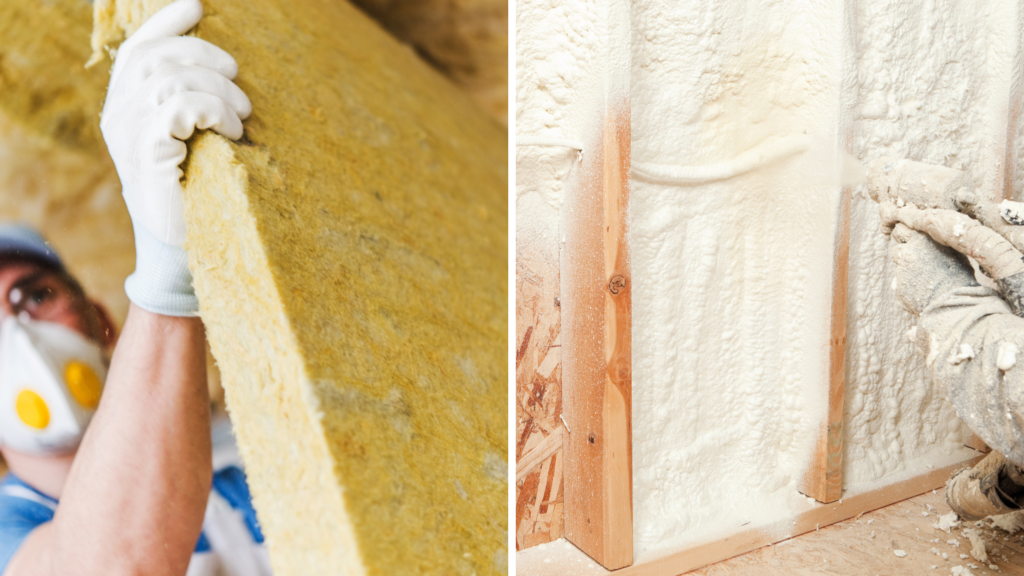Understanding How Thickness Affects R-Value in Spray Foam Insulation

Hey, fellow North Carolinians! 🌞
It’s that time of the year when we start to feel the extremes of North Carolina’s weather, isn’t it? One minute it’s freezing, and the next you’re cranking up that AC. You know what’s a game-changer? Spray foam insulation
But here’s the catch: not all insulation is created equal. If you’ve ever wondered how the thickness of your spray foam insulation impacts its effectiveness, then you’re in the right place. Let’s dive into how thickness affects the R-Values of insulation and why it’s crucial for your home sweet home.
Unraveling the Enigma of R-Values
Alright, pals! Ready for a dive into the world of R-Values? It sounds esoteric, doesn’t it? Well, strap in, because here in North Carolina, we’re about to get both enlightened and cozy.
- So, What Exactly is an R-Value? At its core, the R-Value is the resistance measurement of insulation material to heat flow. Picture it as a stalwart knight guarding your castle. Yep, your North Carolina abode, against the relentless assaults of weather’s caprices.
- The Bigger, The Better? Much like the age-old saying about fish tales, in the land of R-Values, size—or rather, height—truly does matter. Imagine sunscreens. You know how a higher SPF denotes more protection from sunburn? Well, R-Values function similarly. A heftier R-Value? It’s like your house donning shades and a sun hat on those hot, sweltering summer days.
- Why Should Your Ears Perk Up? Ah, dear reader, this is where the proverbial rubber hits the road. North Carolina’s tempestuous temperament, with her sweltering summers and nippy winters, begs for insulation mastery. The right R-Value is akin to your home having the most splendid thermostat. Think: sun-soaked summer afternoons, iced tea in hand, without breaking a sweat. Or those crisp winter eves, ensconced in warmth, while the outside world shivers.
So, next BBQ or neighborly chat across the picket fence? Drop some of these tidbits. Just picture the scene: a warm North Carolina night, fireflies dancing, and you, my friend, dazzling with R-Value wisdom. What’s not to love?
Delving Deeper: The Role of Thickness in Spray Foam Insulation
Hey, fellow North Carolinians! 🌲
Ever stood in the home improvement section, staring at spray foam insulation cans, wondering, “How thick is thick enough?” Trust me; you’re not alone. Let’s untangle this intriguing relationship between thickness and the coveted R-Values.
Doubling Down on Thickness
“Double the foam, double the warmth?” If only it were that straightforward. While it seems logical to assume doubling the thickness of your spray foam insulation would double its R-Value, the reality is slightly more nuanced:
- Yes, Thickness Matters: Adding more layers does boost the R-Value. That’s indisputable.
- Yet, There’s a Twist: It’s not a simple arithmetic progression. You won’t always find that doubling the thickness doubles the insulation value. There’s a little more science behind it.
Take EcoPolySeal as a prime example. Being a stalwart in the insulation world, many homeowners, including yours truly, are big fans. Why? It’s not just about the thickness but also the quality. EcoPolySeal showcases stellar insulation abilities, irrespective of its application depth.
Striking the Right Balance: Finding the Perfect Thickness
Now, here’s where the balancing act comes in:
- Skimping on Thickness: Venture too thin, and you might find yourself shivering on those North Carolina winter nights or sweating buckets in the height of summer.
- Going Overboard: On the flip side, layering your walls like a winter cake might seem enticing, but it can be overkill. You might end up spending more without proportionate returns on insulation.
With North Carolina’s temperate rainforests, scorching summers, and chilly winters, the optimal thickness for your spray foam insulation varies. Our state’s diverse climate makes it imperative to strike the right chord.
Seek Expert Advice
Given our state’s unique climatic challenges, it’s wise to rope in a pro. After all, your home’s comfort is paramount, and an expert can tailor recommendations to fit your dwelling perfectly. Whether you’re nestled in the Appalachians or lounging by the Outer Banks, the right thickness makes all the difference.
So, next time you’re pondering the great thickness debate, remember: it’s not just about quantity but also quality. And with the right blend, your North Carolina haven will feel just right all year around.
Deciphering the Allure of Spray Foam Insulation, Especially the Mighty EcoPolySeal
“Why the buzz about spray foam insulation, and why the love for EcoPolySeal?” you wonder. Dive in, and let’s unearth this mystery.
Not Just Hot Air: The Real Benefits
- A Guardian of Gaps: Think of those tricky corners, tiny gaps, and unexpected nooks. Traditional insulation? It may give them a miss. But spray foam? It’s like a detective, sealing every potential breach. Nothing escapes its vigilant eye.
- Your Wallet Will Thank You: Alright, here’s the rub: You might cringe a bit seeing the initial price tag. But fast-forward a few months, when you’re seeing those reduced energy bills? You might just break into a grin. The long game? Totally worth it.
For the Love of North Carolina: Heart our beautiful state? Join the club! With the looming environmental challenges, it’s heartening to see brands like EcoPolySeal stepping up. They’re not just insulating homes; they’re safeguarding our planet.
Tying Up Loose Ends
Now, here’s the thing. While the dance between thickness and R-Value is undeniably fascinating, it’s not the sole performer on stage. Material quality and adept application? They’re sharing the limelight.
So, if you’re piecing together a new dwelling or jazzing up your North Carolina nest, why not roll the dice on spray foam insulation? Between us, it’s a gamble I’d bet on any day. And your energy bill? Well, prepare for a pleasant surprise! Cheers to wise choices!
Give us a call today to get your FREE no obligation quote and find out if your home is a candidate for our eco friendly state of the art EcoPolySeal Spray Foam Insulation

